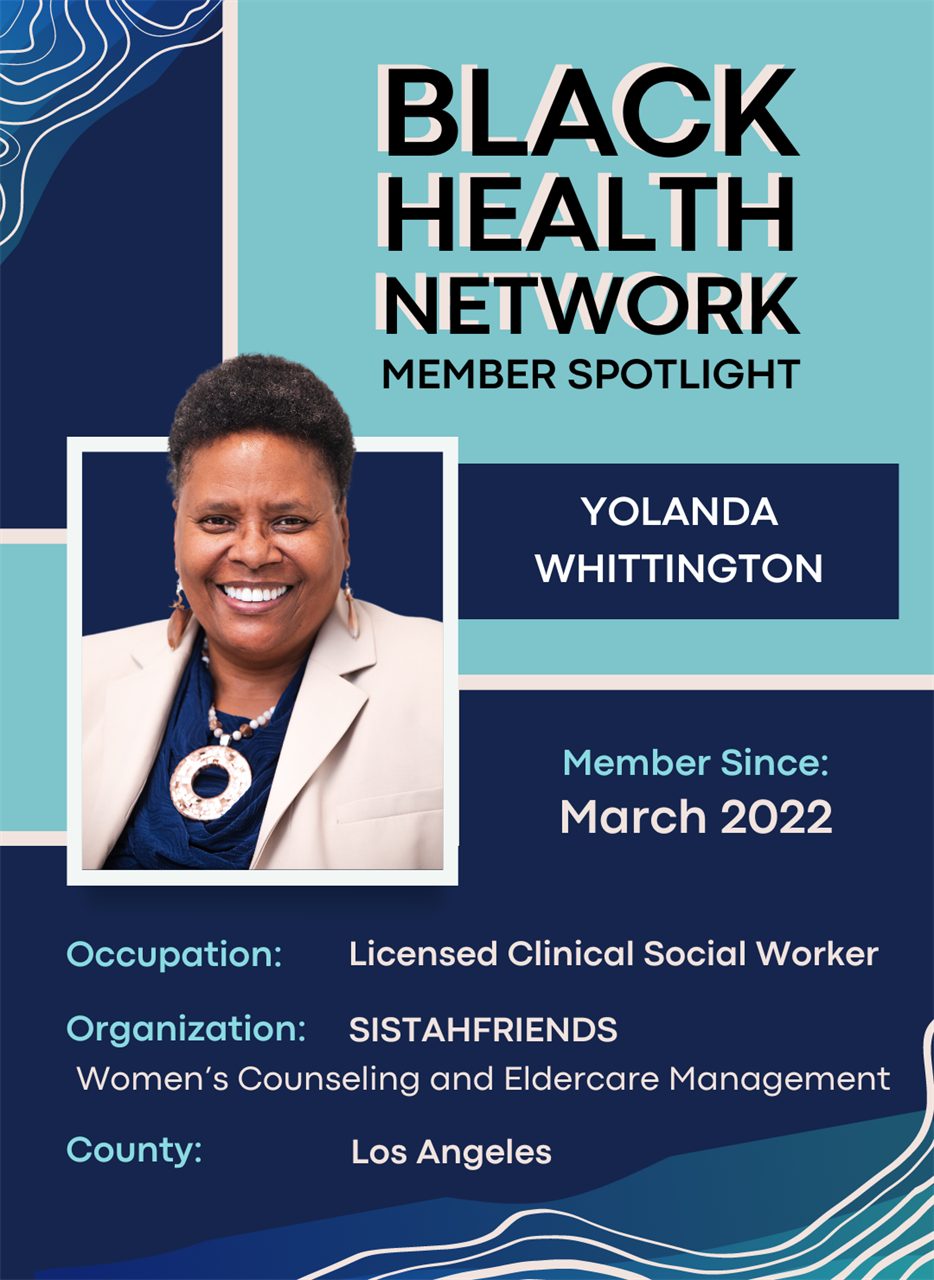
How long have you been a member of the Black Health Network, and what drew you to CBHN?
I have been a member of CBHN for about one year. I was drawn to CBHN because of its commitment to the health and wellness of Black Californians. CBHN is the only organization I am aware of, solely devoted to Black health equity advocacy, reducing health disparities among Black health-seeking constituents, and committed to addressing health's social and economic determinants through education, awareness, and coalition building.
What is your current profession?
I am a Licensed Clinical Social Worker dedicated to the emotional, psychological, spiritual, and physical health of Black people.
From your perspective, what barriers exist in achieving health equity for Black Californians?
I believe several barriers exist, but I will focus on three. The first and most blatant is racism. The conscious/unconscious and biased/unbiased perspectives of Black people by non-Black people inform how Blacks can access care, how we experience the care given, and the disingenuousness and apathy in which we are collectively treated by non-Black healthcare professionals (and a few Black healthcare professionals). There is no compassion or grace applied to the delivery of care. The second is the invisible “caste” system in which Black people are placed in a “stratification hierarchy,” as eloquently articulated by Isabel Wilkerson, “Caste: The Origins of Our Discontent,” which dictates how we are to be treated. The third is the impact of our posttraumatic slave trauma on our inability to “trust” the healthcare system, which has been and continues to be exploited as evidenced by a history of involuntary abortions, hysterectomies, research studies, pain-induced experiments, and the use of our biological cells to transform how terminal diseases are treated, thanks to Henrietta Lacks HeLa cell line, which immortalized one of the most important cell lines in cancer medical research.
Both in your work and with CBHN, how have you been able to prioritize Black mental health?
I have always been devoted to Black mental health and continue to be interested in mental health issues that impact Black people, especially those who are least likely to receive services. Black people are greatly affected by stress, anxiety, depression, and grief and loss, which is almost always directly correlated to racism, posttraumatic slave syndrome, or social stratification. This is usually manifested in Blacks being disproportionately represented either in the child welfare, juvenile justice, or correctional systems or economically impacted as reflected in unfair labor wages or high rates of unemployment and high rates of school failure in the K-12 public school system.
You serve as the lead for BHN's Behavioral Health Peer Network; what motivated you to take on the role, and what do you hope to accomplish?
I feel honored to serve CBHN as their Behavioral Health Peer Network lead. Black Mental Health is essential to our survival and intergenerational emotional health and wellness. For the first time, there is this emerging acceptance by Black people of the importance of one’s mental health. We are beginning to move away from the stigma and fully embrace our mental health. This is so exciting! Our children, youth, elders, and I am especially enthused by our Black men, all of whom are embracing their mental health. In this role, I hope to work with CBHN to both promote Black mental health and create a health provider resource directory so that Black consumers interested in finding health providers to serve them can access them through CBHN’s statewide directory.
What inspires you to keep doing the work you do?
We will probably be dealing with the reverberations of racism for quite some time. I see my role as helping us to care for ourselves in the presence of this invisible enemy and to allow us to cope with the emotional harm that comes with being Black in America. Further, I am committed to the healing work of our ancestors. We have been devastated by the psychological impact of chattel slavery and continue living with the psychological effect of posttraumatic slave syndrome. I am committed to being of service to us on our healing journey.